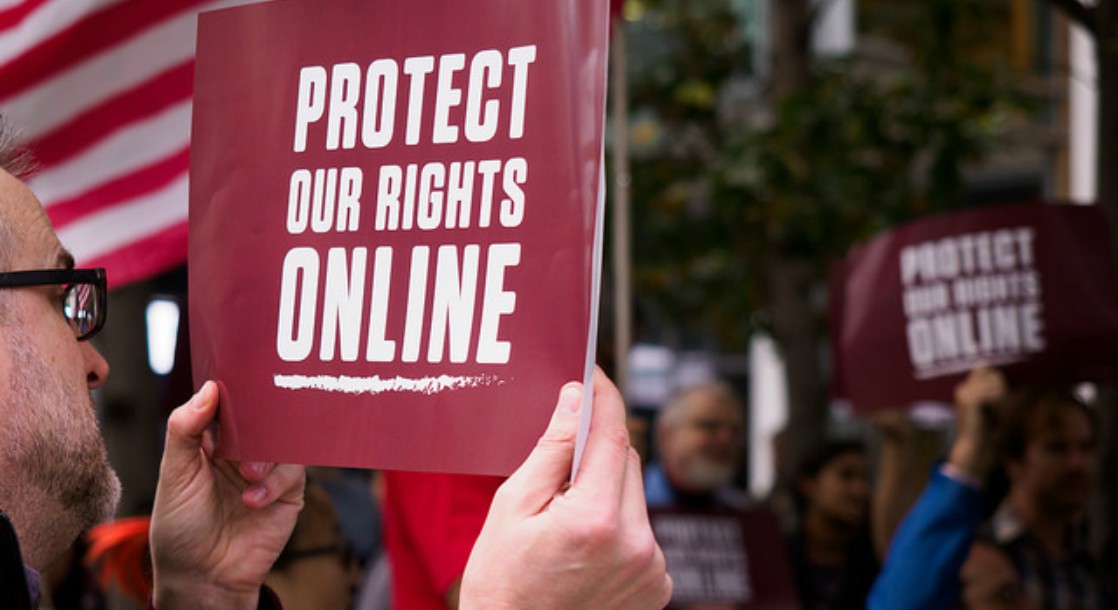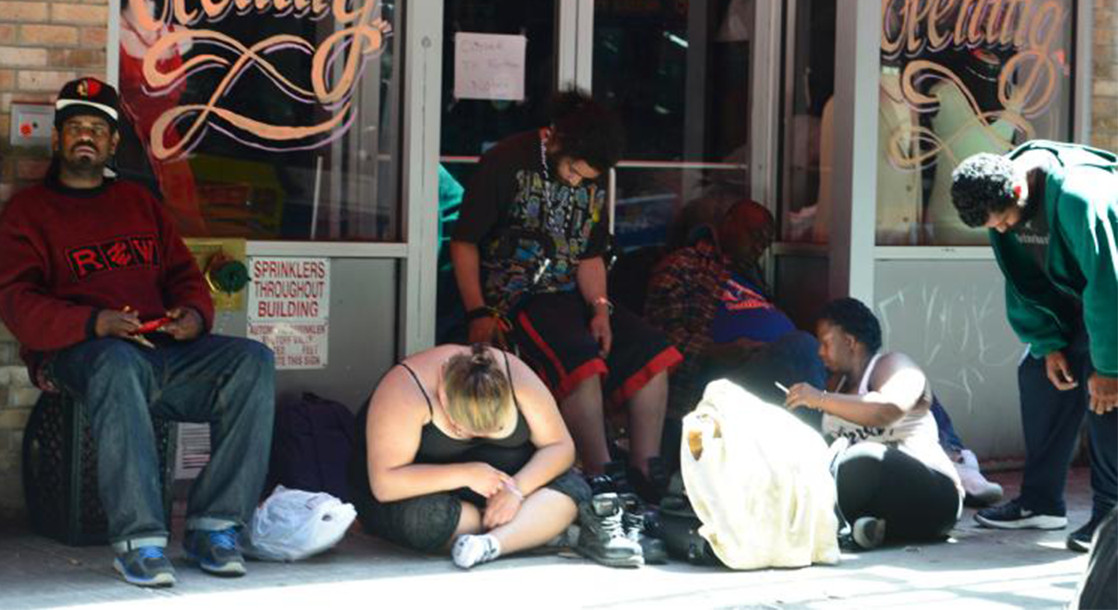Image via Flickr user Credo Action
Here at MERRY JANE we’re convinced that the world revolves around cannabis. From politics to culture, civil rights to economics, you can find keef dusted across every facet of modern life. But in these increasingly divided times, where natural disasters go damn-near ignored for two months and Twitter fingers have almost literally become trigger fingers, it's become increasingly important to highlight the most pressing news outside of the cannabis space. In a bi-weekly round-up MERRY JANE will break down the stories making waves in media, politics, technology, and culture — keeping you up to date on what’s making our world tick. Here's what you Need To Know.
In a move that would shift control over the world wide web and turn comprehensive internet access into even more of a luxury than it already is, the Federal Communications Commission (FCC) announced a plan on Tuesday to remove Obama-era U.S. internet freedom protections, smashing the policy commonly referred to as net neutrality.
But who's behind this latest threat to the internet's status quo, what could it mean for your everyday life online, and how can you act to protect net neutrality? To answer those questions and more, we've compiled a series of deep dives and complimentary resources to help you sort out exactly what's going on with the most recent attack on the web.
FCC head Ajit Pai, an appointee of Donald Trump and former in-house corporate lawyer at Verizon, presented a plan on Tuesday that would let Internet Service Providers (ISPs) like Comcast, Time Warner, Verizon, and Cox set limits on their customers’ internet access to better serve the company’s own financial goals.
The action would remove the equal access freedoms to online content awarded by the FCC under President Obama — which classified "broadband [as] a public utility, as essential as phones and electricity — instead allowing ISPs to operate their companies with minimal oversight and to restrict access to data and information however they see fit.
For example: if you invite a date from your favorite app over to chill, you assume that once you’re logged onto your apartment’s wi-fi, Netflix, HBOGo and Hulu will all run at the same speed, giving you plenty of options to entertain with minimal lag. But if Pai is successful in his plans to remove net neutrality protections, your ISP would have the ability to play favorites, and slow or restrict access to certain sites while fast-tracking access to others — meaning your Comcast overlords could stream their pay-to-play live TV portal to you at lightning speed, while turning Netflix into a constantly buffering buzzkill, dooming you and your boo to catch up on Storage Wars reruns with full commercial interruptions instead of binge-watching Mindhunter.
In addition to hampering your cheap dates at home, a removal of net neutrality rules would also allow ISPs to block access to websites they didn’t like and collect data about every keystroke you make, all without any government oversight from the FCC, which could have a severely chilling effect on free speech online, political and otherwise.
In the hours since Pai’s most recent announcement, internet companies of all sizes, from Google and Amazon to tiny start-ups, have spoken up against the planned change, citing the current net neutrality protections that Pai calls “the government micromanaging the internet” as essential to preserving freedom of information on the web.
Defending the proposed net neutrality roll back, Pai has time and again argued that his corporate-pandering plan is simply a harkening back to the internet rules as they existed in 2015 and before — an attempt to Make the Internet Great Again if you will — calling the idea that ISPs would adjust internet access as “theoretical” and claiming that open web protections have “depressed investment in building and expanding broadband networks and deterred innovation.”
Putting aside the fact that Pai’s ex-employer Verizon is still constantly hiring construction crews around the country to wire new cities and streets with their Fios fiber optic cables, and that Comcast, owners of the tallest skyscraper in the company’s home city of Philadelphia, is currently in the process of erecting a second, even taller headquarters literally next door to their current high rise office, Pai’s claims of “theoretical” ISP foul play are actual very tangible, and likely to grow bigger and badder under the privatization plan. Let’s start at the beginning.
When the FCC first added the internet into the agency’s oversight purview, joining mass communication mediums like telephones, television, and radio, they placed the world wide web under the loosely-governed Title I statute of the Communications Act of 1934. Under these relaxed regulations, Comcast used their control to block their customers transferring files through programs like BitTorrent, while AT&T used their heavy hand to censor a 2007 Pearl Jam concert, turning off sound on the company’s exclusive stream when lead singer Eddie Vedder groaned then-controversial statements like "George Bush, leave this world alone.”
It wasn’t until a lawsuit from Verizon, arguing that the FCC didn’t have authority to regulate ISPs, that the federal agency moved the internet’s oversight into the significantly stricter Title II tier of the Communications Act, classifying the internet as a standard utility and guaranteeing equal access to everyone.
Pai’s plan would remove those Title II protections entirely, granting new revenue streams to telecom fat cats while tightening their already Vader-like grip on internet customers.
Adding to his steadily growing stack of corporate handouts and insults to the 99%, Donald Trump is fully on board with the net neturality roll-back. And while the president has spent this week using his favorite social media tool to harass black athletes and their parents instead of supporting his pal Pai, an almost nonsensical tweet from 2014’s net neutrality debate gives you a pretty good idea of where the president stands.
Obama’s attack on the internet is another top down power grab. Net neutrality is the Fairness Doctrine. Will target conservative media.
— Donald J. Trump (@realDonaldTrump) November 12, 2014
So what can be done to get in the way of Ajit Pai, the FCC, and the Trump administration’s plan to hand over internet controls to Verizon, Comcast, and the rest? The fight is dire and imminent, but not new, and a look at past successes in the struggle for internet freedom can provide an important road map to assure open access continues as the law of the land.
In 2014, a huge group of America’s favorite web-based companies participated in Internet Slowdown Day, changing their homepage to a constantly-spinning loading icon, suggesting what might become of our favorite sites if net neutrality protections didn’t succeed.
After more recent attempts to rollback open internet rules since Pai was appointed FCC head in January of this year, groups like Save the Internet and Battle for the Net have organized letter-writing campaigns encouraging the FCC to rethink their decision and phone campaigns aimed at convincing Congress to legislate clear and final protections for the internet.
Those campaigns, and incredible amounts of work from regular citizens, progressive lawmakers and companies, proved to be successful, upholding net neutrality rules through the first 11 months of the Trump administration.
To give Americans a look at what the world looks like without open internet regulations, internet users in New Zealand, Portugal, and Spain have taken to Twitter with screenshots of complicated broadband data plans, with specific streaming companies and services blocked until a fee is paid directly to the ISP.
Hey, USA! In New Zealand we don't have #NetNeutrality. What I'm about to link and post to you is real. This could be what's in your future. https://t.co/Kye4w0e6zh pic.twitter.com/l2OOyp8C0S
— Still A Witch, Damn You! (@Kitsunelaine) November 22, 2017
Because Pai made his most recent announcement only yesterday, those same campaigns have not yet adjusted to represent the current situation, but we're confident that new efforts will be mobilized in the coming days. In the meantime, you can do a small bit of your own research to contact your local lawmakers and the FCC to tell them that you don’t support their business-first, citizens-second approach to the internet.
Showing their continued support for online freedom and equal access to technology, progressive leaders including Bernie Sanders and Kamala Harris have already taken to social media, calling for significant action rebuking Pai’s plan.
Add your name to mine if you agree that we need to protect and expand internet access, not restrict it with pay-for-play: https://t.co/kx2j6UOS07
— Kamala Harris (@KamalaHarris) November 22, 2017
Once again, the Trump administration sides with big money and against democracy. If this passes, the internet and its free exchange of information as we have come to know it will cease to exist. #NetNeutrality https://t.co/1oKLkWOpYn
— Bernie Sanders (@SenSanders) November 21, 2017
While it certainly appears that Pai and Trump’s FCC will move quickly to remove net neutrality protections, if there is any concession that can be made about the futility you may feel when hearing the voicemail message of your local Representative 15 times a day, it’s that, as Trump has shown, internet action is a partisan play, and could be just as temporary as the Obama-era net neutrality rules Pai is trying to remove.
If Trump’s FCC is successful in removing online protections, just as quickly as the tweeter-in-chief plugged Pai into the FCC’s top role to help their corporate pals, a new president in the Oval Office in 2020 could easily appoint someone to replace Pai and begin the job of restoring net neutrality.
But while bureaucratic lobbying and petitions could very well save our internet freedoms for the time being, a response to Pai’s plan from Vice’s Motherboard suggests that society will only be able to provide equal and free access to the internet once we’ve given up our reliance on multinational corporate ISPs. By trading the web’s current power structure for local providers based out of municipal governments, small businesses, and community nonprofits, Jason Koebler reasons that citizens could use existing public infrastructure and local organizations to finally ditch the ubiquitous telecom giants once and for all.
So write the FCC, call your Congress people, and start watching YouTube tutorials on constructing localized networks — after all, it might not be long before your favorite video site is slowed to a snail’s pace or stuck behind a Comcast paywall.











